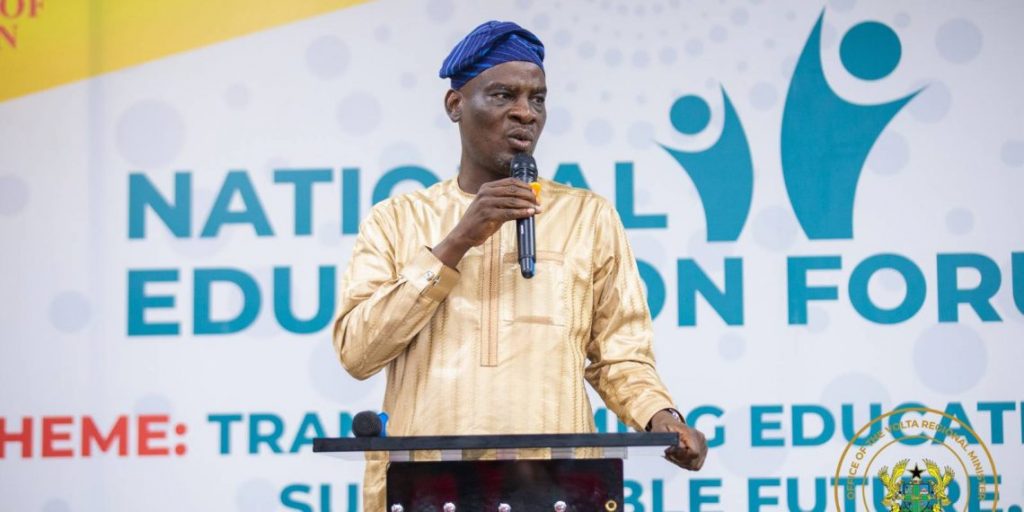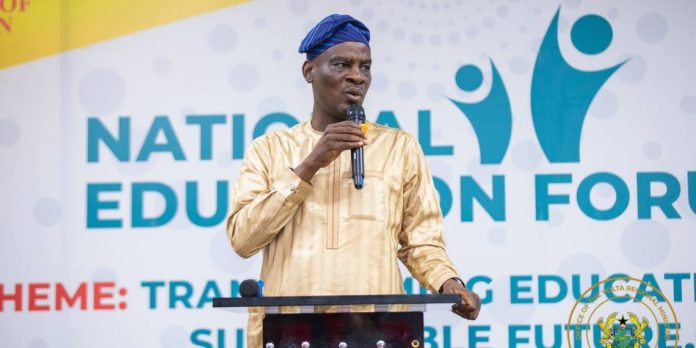
The Minister for Education, Haruna Iddrisu, has revealed that the government is taking decisive steps to gradually eliminate the double-track system in Senior High Schools (SHSs), a policy that has drawn widespread debate since its introduction under the Free Senior High School (Free SHS) programme.
Speaking at a media briefing in Accra on Sunday, August 24, 2025, Mr. Iddrisu explained that the double-track system, while useful in managing overcrowding in SHSs at the height of the Free SHS intake, has had unintended consequences on academic performance.
“The double-track system has impacted negatively on the quality and outcomes of education under the Free SHS policy. Students have fewer contact hours and less study time, which affects their performance. Government’s commitment to ending the system can only be realised at three levels: expanding infrastructure, strengthening digital resources in schools, and allowing private SHSs to absorb qualified students to ease the pressure,” he stated.
To oversee this transition, an 11-member committee has been inaugurated to guide the reversal from the double-track to the single-track system. The committee, chaired by Prof. Peter Grant of the University of Cape Coast (UCC), will review the 2024/2025 academic calendar and propose a comprehensive roadmap for the phase-out.
Other members of the committee include:
- Prof. Godwin Awabil, University of Cape Coast (UCC)
- Prof. Samuel A. Atintono, President of the Conference of Principals of Colleges of Education (PRINCOF)
- Prof. Smile Gavua Dzisi (Mrs.), Deputy Director-General (Management Service), GES
- Dr. Munawaru Issahaque, Deputy Director-General (Quality and Access), GES
- D. W. Agbenyo, WAEC
- Dr. Rosemond Wilson, WAEC
- Mr. Augustus Agyemfra, Council for Distance Education (CODE)
- Mr. David Odjidja, Conference of Heads of Assisted Secondary Schools (CHASS)
- Addo Nicholas Nii Kpakpoe, Conference of Heads of Basic Schools (COHBS)
- Prince Charles Agyemang-Duah, Schools & Instructions Division, GES
Education think tanks, teacher unions, and parent associations have long pushed for the abolition of the double-track system, arguing that it disadvantages students academically and socially. The latest announcement, therefore, is expected to be welcomed, although concerns remain about timelines and funding.
Mr. Iddrisu assured that government will prioritise the welfare of students and teachers throughout the process, stressing that the reforms are not only about infrastructure but also about modernising education delivery in Ghana.
“The Free SHS policy is here to stay, but it must be improved to guarantee quality as well as access. The single-track system remains the best model for achieving this balance,” he affirmed.
























































![[FREE FREE MONEY] Predict and Win a Guaranteed GH¢200 From Us EVERY WEEK](https://wordpress.ghanatalksradio.com/wp-content/uploads/2022/02/Predict-and-Win-Final-09-03-2021-218x150.jpg)
![[Predict & Win – 8th/Oct.] WIN A Guaranteed ¢200 From Us This Week](https://wordpress.ghanatalksradio.com/wp-content/uploads/2021/10/maxresdefault-16-218x150.jpg)
![[Predict & Win – 2nd] WIN A Guaranteed ¢200 From Us This Week](https://wordpress.ghanatalksradio.com/wp-content/uploads/2021/09/maxresdefault-50-218x150.jpg)
![[Predict & Win – 25th] WIN A Guaranteed ¢200 From Us This Week](https://wordpress.ghanatalksradio.com/wp-content/uploads/2021/09/maxresdefault-36-218x150.jpg)
![[Predict & Win – 18th] WIN A Guaranteed ¢200 From Us This Week](https://wordpress.ghanatalksradio.com/wp-content/uploads/2021/09/maxresdefault-23-218x150.jpg)











![[National cathedral] See full list of churches that have contributed since 2018](https://wordpress.ghanatalksradio.com/wp-content/uploads/2020/09/Ghana-National-Cathedral-GhanaTalksRadio-100x70.jpg)

![[UTAG strike] Govt committed to resolving issues – Education Ministry PRO](https://wordpress.ghanatalksradio.com/wp-content/uploads/2020/12/UTAG-meet-Bawumia.jpg)

